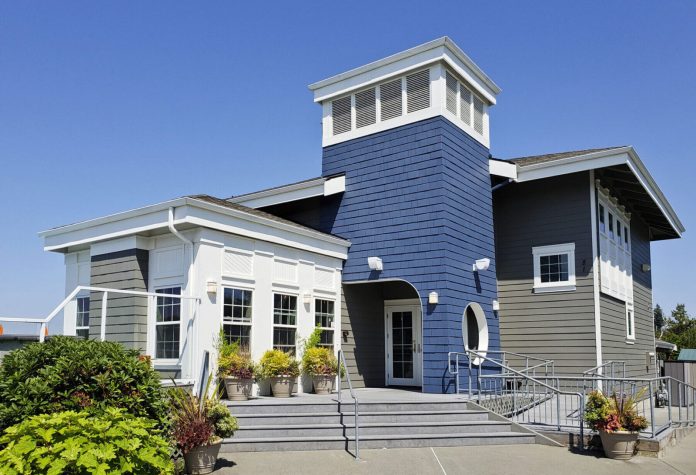
Betsi Hummer showed her true conservative colors at a billionaire-hosted fundraiser.
Lest one think that Bellevue has exclusively become the city of Amazon, Facebook, and other tech giants, old money and older names still want to play ball in the city’s evolving political arena. In particular, the billionaire Freeman family — owners of Bellevue Square shopping mall and beneficiaries (and instigators) of mid-20th century racial exclusion — still wields its might through its support of political campaigns and local causes. Conservative City Council candidate Betsi Hummer was the most recent recipient of this support through a fundraiser hosted by Kemper Freeman, Jr. and others at the Newport Shores Yacht Club in late July.
Normally these affairs are closed-door and private only to the dozens of people in attendance, but with a video posted by Chinese Radio Seattle and shared on her campaign’s social media page, we’re able to get a 20-minute glimpse into Hummer’s message to her most ardent supporters. Among these backers includes current Councilmember Conrad Lee and Deputy Mayor Jared Nieuwenhuis, who were each introduced to the crowd and represent Bellevue City Council’s most conservative, Republican-supporting wing. Also in attendance was Council candidate, Paul Clark, a small business owner challenging sitting progressive Councilmember John Stokes for Position No. 1.
Voters might already be familiar with Hummer, who served as chair of the exclusionary East Bellevue Community Council (EBCC) from 2017 to 2021. Before the group was dissolved through bipartisan state action in 2022, the EBCC had final veto authority over land use decisions that impacted the Lake Hills neighborhood. Members could not propose land use codes of their own and thus did not have full governance authority over their jurisdiction; they could only choose to veto actions of the Bellevue City Council or allow them to be applied to their area of the city. Use of this unique power led to more onerous requirements for homelessness services, lower maximum housing capacity, and other unfair incongruences between the codes of east Bellevue and the rest of the city. But some decisions were even more costly than a longer land use code — in 2021, the City of Bellevue was required to pay the EBCC’s legal fees when they defied a state law mandating lower parking minimums to support affordable housing proposals.
Hummer points to this record of public service when speaking about her priorities of public safety, reducing traffic, controlling development, and increasing engagement with legacy neighborhood voices. Her support of public safety and Bellevue’s Police Department apparently goes so far that Hummer, a White woman, serves on BPD’s Latino/Hispanic Advisory Council.
“In my neighborhood, that’s where a large number of Hispanic-ancestry people live, and I do not see them represented at City Hall, so I am their voice,” she said to the overwhelmingly White audience in attendance.
Her problematic insights don’t stop at assuming her perspectives as a White homeowner align with and are representative of those in the Hispanic community. At the end of her speech, Hummer acknowledges that she’s heard other concerns from people as she’s been knocking on Bellevue doors, but she says her four issues are about sticking with the fundamentals of governance.
“There are other things that come up, like housing affordability — and that’s a deep, entangled issue — and homelessness, and then the other kinds of crime, but we need to start with the basics.”
As concerning as her characterization of homelessness as inherently criminal is, equally damning is her failure to see the provision of affordable housing as a fundamental government function for the most expensive city in Washington state. Her approach to housing growth more broadly would mirror the priorities of existing conservative Councilmembers who want minimal changes to the city’s single-family neighborhoods.
“My pledge to you is to make sure [new housing units] go in our growth corridors,” Hummer said. “We want to make sure… that the developers — the people with the property and the vision for what it can be — are listened to and then their views are adopted through the City Council and through our Planning Commission.”
On the implementation of missing middle housing legislation like HB 1110 and HB 1337, Hummer wants a solution that works “for the [single-family] neighborhoods,” Hummer said. “I believe [implementation] can work for everyone, but we need to make sure that we have the vision and the neighborhood input that will make it work.”
Without more details, and given her prior history opposing state housing actions, it’s not hard to interpret this statement as a desire to make middle housing legislation as ineffectual as possible to appease the interests of single-family homeowners.
And if questionable comments and support for exclusionary housing policy weren’t enough, Hummer makes untrue and misleading statements about her opponent’s support for public safety. Incumbent Councilmember Janice Zahn, whom The Urbanist Elections Committee has endorsed, supported an amendment to the city’s 2023-24 budget to pilot a non-police response team to behavioral health crises. This program would have proceeded alongside an ongoing rollout of a co-responder program that sees mental health workers respond alongside armed police officers. The amendment failed along a 5-2 vote.
An additional amendment to postpone funding for a new seven-member police unit to patrol light rail stations failed on a 6-1 vote, with only Councilmember Jeremy Barksdale voting to remove funding for the program. In her speech, Hummer incorrectly says that Zahn “supported amendments to not fund the transit police, and she supported an amendment to not fund… mental health police.” Both claims are false and mischaracterize how budget discussions proceeded last fall, but both are just part of a larger strategy to link perceived public safety failures in Seattle with a potential “decay” in Bellevue.
Speakers after Hummer make this clearer, with one host running the full gamut of conservative talking points, from disparaging panhandlers as people “who don’t want to work” to saying that the opening of East Link light rail will bring more crime. “We’re fighting against people who, like spoiled children, will rant and rave and scream until they get what they want. And we can no longer accept that or we will turn into Seattle,” he says without explaining how Zahn’s conduct reflects this characterization or how her votes have been a harbinger of urban decay. And with a police department that received a 21.2% increase in its budget from the previous biennium, added 19 positions for commissioned officers, and had its union’s contract unanimously approved by its Council, it’s hard to paint Bellevue as a city that has not supported its police.
Still, Hummer closes her speech by leaning into a savior narrative that rivals Trump during his 2016 campaign.
“What I am offering the city of Bellevue is to change the course,” Hummer said. “We’ve all seen it go on that slippery slope down towards Seattle, towards lawlessness. And I will bring us back from that.”
What she and her supporters correctly recognize is the immense change that Bellevue is undergoing in a short amount of time. From a city historically dominated by the political interests of its single-family neighborhoods, wealthy business elite, and conservative institutions, Bellevue has rapidly transformed into a diverse, pluralistic center of our urbanizing region. With that pluralism comes a necessary liberalism — one not just enshrined in visions and diversity pledges, but one for which active space is made through policy solutions. By allowing for housing that fits all types of families, building a transportation system where people can get around how they please, and creating better social support infrastructure, we bring about a city that works better for everybody.
So when Hummer says, “I love Bellevue just like you do,” to the crowd that is accustomed to a city that instead serves their own interests, she’s making clear what that love really means.
Chris Randels is the founder and director of Complete Streets Bellevue, an advocacy organization looking to make it easier for people to get around Bellevue without a car. Chris lived in the Lake Hills neighborhood for nearly a decade and cares about reducing emissions and improving safety in the Eastside's largest city.


